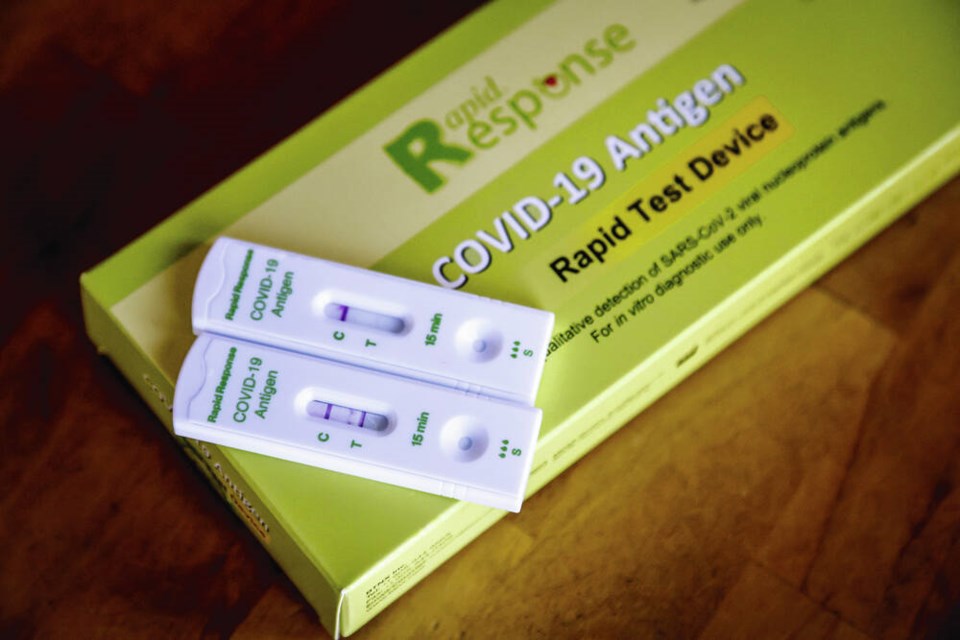Pharmacist Lily McWilliams says customers at her Saanichton store ask daily for free COVID-19 rapid antigen tests, but she has run out and a new supply from the province has yet to arrive.
“There was a bit of a lull, I would say, during June and July, but the requests have now started again — daily for sure,” said McWilliams, the chief operating officer at Cridge Family Pharmacy on Keating Cross Road, one of three locations in the capital region.
The provincial Health Ministry says tests will be available as the fall respiratory-illness season approaches.
As the Omicron variant of the virus began to tear across Canada at the end of 2021, the federal government quickly bought up rapid antigen tests, distributing most of them to the provinces so people could swab themselves for the virus at home. Since the beginning of the pandemic, Canada has spent roughly $5 billion on rapid tests.
After B.C.’s phased-in distribution of tests to health-care workers and long-term care homes, for instance, the tests were distributed to the public free of charge through pharmacies — those age 70 and older beginning in February 2022 followed by the release of more tests for those 40 and older in March.
The federal government ended the provincial test distribution on Dec. 31, 2022, according to the Health Ministry.
For pharmacies such as Cridge, what stock remained in recent months had literally “dried up and was unusable,” said McWilliams.
Other pharmacies had supply that expired but that product was given new life when Health Canada extended the expiry dates for some rapid antigen tests. For example, the Abbott Panbio Nasal COVID-19 Rapid Test Device has been extended to 24 months from the “date of manufacture” and for the Artron COVID-19 Antigen Test, another six months can be added to the “expiration date.”
Other pharmacies had expired stock that couldn’t be extended.
A Shopper’s Drug Mart in Esquimalt had no tests on Tuesday but pharmacist Oscar Ho at London Drugs in Saanich said his location did have stock for now but had yet to hear if more would arrive for the fall.
Meanwhile, the federal health department has about 55 million COVID-19 rapid antigen tests it plans to keep in reserve, according to an internal Health Canada memo obtained by Canadian Press and reported on last month. The federal government also has an additional stockpile of 39 million rapid antigen tests it is figuring out what to do with, including donating some to non-profits, public institutions and charities through GCDonate, a part of the government’s online surplus site.
The province currently has 18.7 million tests available in its inventory, according to the Health Ministry.
B.C. plans to maintain a supply of approximately four million tests to support at-risk or vulnerable groups during the upcoming 2023-24 respiratory-illness season, said the Health Ministry in a statement.
The Health Ministry says B.C. pharmacy distributors have been supplied with newer product to replace any expired product and any pharmacies with no or low supply can contact their distributor for more.
B.C. Pharmacy Association spokesperson Michael Mui said the association is seeing consistent numbers of rapid antigen test kits being distributed to pharmacies over the past five weeks, “generally between 50,000 to 100,000 test kits per week.” That number is expected to kick up during the fall when it’s anticipated COVID-19 cases will again increase.
Each kit should come with multiple tests — the Rapid Response brand has five tests per package — and they are free for the public if they wish to keep a kit on hand at home, said Mui.
“Access to COVID-19 rapid tests will continue to be available free-of-charge at community pharmacies throughout the 2023-24 respiratory season or until the current stock is depleted,” said the Health Ministry.
Pharmacies can order them from distributors free of charge.
Since the start of the pandemic, Island Health has received 1.65 million tests for its use with health-care workers, long-term care and assisted living, collection and assessment centres, and for supporting rural, remote and Indigenous communities.
That number does not include tests made available for workplaces, through community pharmacies for individuals and through other channels.
More information on rapid antigen tests can be found on the B.C. Centre for Disease Control .
— with file from Canadian Press
>>> To comment on this article, write a letter to the editor: [email protected]



